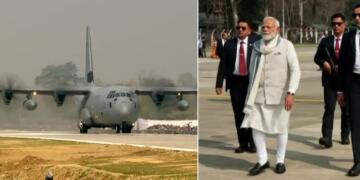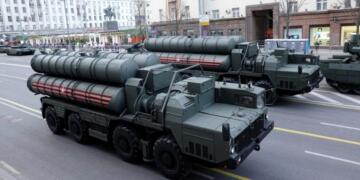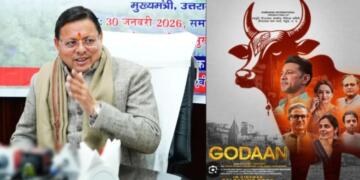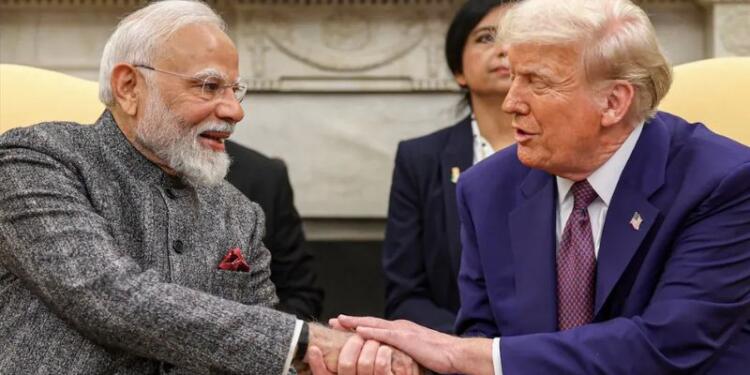Days after US officials asserted that India will be kept out of the club of countries that will face major brunt of reciprocal tariffs, US President Donald Trump himself has expressed optimism about the ongoing trade talks between India and the United States.
Replying to concerns on New Delhi allegedly imposing “high tariffs”, Trump categorically asserted that India US trade talks will work out well. During the press conference, he also heaped praises on the Indian Prime Minister calling PM Modi a “great friend” and “very smart man”.
Speaking to reporters at the White House, Trump said, “Prime Minister Modi was here just recently, and we’ve always been very good friends. India is one of the highest-tariffing nations in the world… They’re very smart.”
US President Donald #Trump praised #PMModi, calling him a smart and great friend. Discussing India-US tariff talks, he expressed confidence that the discussions would lead to positive outcomes, highlighting the strong relationship between the two nations.pic.twitter.com/wjbyP2FApU
— The Frustrated Indian (@FrustIndian) March 28, 2025
The POTUS added, “He is a very smart man and a great friend of mine. We had very good talks. I think it’s going to work out very well between India and our country. And I want to say you have a great prime minister.”
His remarks come days ahead of the 2nd April deadline after which Trump’s reciprocal tariffs would kick in. As per Trump’s tariff warning, the US is all set to impose reciprocal tariffs on countries, with India potentially emerging as a notable exemption, for what Trump describes as unfair trade practices by the host nation.
One of the Highest-tariff imposing nation: Trump’s stance on Indian trade policies
Criticising New Delhi’s consistent policy of allegedly imposing high tariffs, Trump had earlier said, “I have a very good relationship with India, but the only problem I have with India is they’re one of the highest-tariffing nations in the world. I believe they’re probably going to lower those tariffs substantially, but on April 2, we will be charging them the same tariffs they charge us.”
Accusing India of adopting restrictive trade practices, Trump opined, “You can’t sell anything into India, it is almost restrictive. They have agreed, by the way, (that) they want to cut their tariffs way down now because somebody is finally exposing them for what they have done.”
As per reports, India has taken a slew of policy measures to court the Trump administration as well as strengthen trade ties with the US, rather than needlessly engaging in one upmanship or brewing trade tensions over the issue of tariffs. Reportedly, India has committed to increase energy purchases $ 25 billion, up from $ 15 billion last year from the United States.
On his part, POTUS opened defence opportunities for India announcing that New Delhi could soon acquire F-35 stealth fighters.
Additionally, New Delhi has also reduced import duties on key parts needed in EV batteries and phone, slashed tariffs on bourbon whisky from 150 per cent to 100 per cent.
Furthermore, Elon Musk has been making great strides in the Indian telecom sector with his Starlink’s entry into India now being considered a surety ever since it inked agreements with Reliance and Airtel.
Also Read: Trump Reciprocal Tariff Deadline Nears: New Delhi Secures Diplomatic Win
Nonetheless, Trump has repeatedly taken a dig at India’s trade policies and once described India as “tariff king”, he has been appreciative of the leadership of the Indian Prime Minister. Coming from an aggressive Presidential campaign on MAGA, Trump has, on several occassions, underscored PM Modi’s nationalist viewpoint behind not drastically slashing import duties on US goods. As a result, he has so far refrained from adopting extremely hard political rhetoric viz-a-viz Canada, China and Mexico against India or straining economic ties with India. Furthermore, PM Modi’s visit to the White House earlier this year and the ongoing trade talks dubbed as “India-US Fast Track Mechanism” has assured that both the nations achieve an amicable trade agreement, rather than exchanging blows over the issue of reciprocal tariffs.


























